A sunlit afternoon by the pool promises relaxation and leisure, but the unwelcome buzz of bees and wasps can quickly turn tranquility into tension. These winged intruders, drawn to the shimmering water and sweet scents of sunscreen, can disrupt the peaceful ambiance with their persistent presence. Whether you've experienced a swarm of unwanted party guests or just a few curious explorers, keeping these insects at bay is a challenge many pool owners know all too well.
Recalling the time my niece ran in panic after spotting a wasp near her floatie, I realized the importance of safeguarding our watery oasis. The trick lies in understanding what attracts these creatures and using that knowledge to keep them away effectively. It's not just about swatting them or hastily covering sweet drinks; it's about creating an environment that subtly whispers "no entry" to them, while still welcoming friends and family.
Various strategies exist, from natural deterrents like strategically placed plants to clever use of poolside accessories. Each method offers its own set of advantages, and combining several can create a formidable defense. In this guide, we'll explore practical and innovative approaches to ensure your poolside remains a sanctuary, free from the pesky interruptions of bees and wasps, leaving you to enjoy the lazy afternoons without a care in the world.
Create Alternative Water Sources
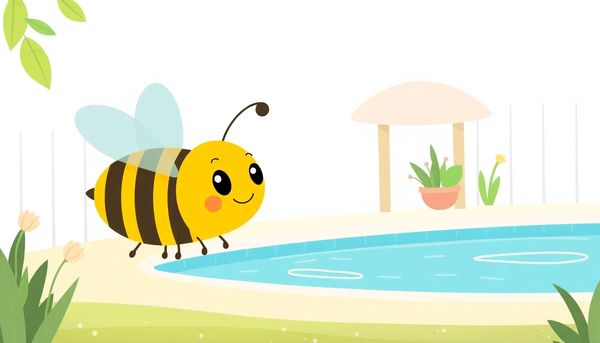
Bees and wasps may be uninvited guests at your pool party, but they're simply on a quest for hydration. One simple yet effective way to redirect their attention is by creating alternative water sources that draw them away from your aquatic retreat. It doesn't require a monumental effort; a modest birdbath or a shallow dish can suffice. Choose a spot in your garden, perhaps near flowers or shrubs, where bees naturally gravitate. Fill it with fresh water and add a few stones or floating pieces of wood to provide safe landing and resting spots for these winged visitors.
If you start early in the season, before pool days are in full swing, bees and wasps will establish this area as their go-to watering hole. This proactive step helps keep them away from the pool when it finally opens. Remember, maintenance is key. Check the water levels regularly, particularly in warm climates where evaporation is rampant. Refill and refresh the water often to ensure it remains enticing.
By offering an inviting alternative, you'll not only enhance your leisure time by the pool but also support the local ecosystem. Bees, after all, play a crucial role in pollination, and wasps help control other pesky insects. So, with just a bit of creativity and care, you can coexist peacefully with these essential creatures, ensuring everyone finds their rightful place.
Redirect Bee Activity
Ever wonder why bees seem so drawn to your pool? It's not just the allure of shimmering blue water. In their world, your pool is a much-needed oasis, a place to quench their tiny thirsts. Instead of waging a war on these prolific pollinators, consider a gentle redirection of their industrious activity.
Start by offering these little foragers an enticing alternative. A shallow dish or birdbath filled with fresh water can be their new favorite spot. Add a few pebbles or pieces of wood to give them a safe landing pad. This simple setup could become their trusted watering hole, reducing their poolside visits. Remember, the aim is to encourage them rather than evict them; creating a fragrant herb garden nearby can further entice them away from your splash zone.
Be mindful of the environment you create around your pool. Avoid floral or fruity scents in sunscreens or candles, which can act as an unintentional beacon to bees. Instead, opt for natural oils with repelling properties, like eucalyptus or citronella.
Moreover, timing is everything. Bees are most active during the heat of the day, so scheduling your pool time in early mornings or late afternoons can minimize encounters. With these subtle shifts, you can peacefully share your backyard with bees, enjoying your pool while ensuring they have a safer space to thrive.
Provide Safe Drinking Zones
When looking to protect both your poolside bliss and the bees' survival, offering them a designated watering spot can be a game-changer. Bees and wasps are not out to ruin your swim session; they’re simply searching for hydration. Providing a more appealing and safer alternative can redirect their attention away from your pool.
Consider setting up a bee-friendly station with a shallow birdbath or a wide, flat dish. Fill it with water and add a few stones, marbles, or pieces of cork. These additions serve not only as landing pads but also as tiny safety rafts should any bee take an unintended dip. This setup ensures that bees can drink without risk of drowning, transforming your yard into a sanctuary rather than a hazard.
In my own garden, I once saw a dramatic reduction in poolside bees after placing a couple of shallow bowls filled with water and pebbles under a shaded area. It was a simple gesture that simultaneously kept the bees hydrated and the poolside peaceful. As the water will evaporate, especially in the scorching summer heat, make sure to refill these makeshift bee oases regularly.
Plan ahead by establishing these water zones before opening your pool for the season. This way, bees will naturally gravitate toward their new drinking spots from the get-go, leaving your pool area blissfully buzz-free. This harmony enhances your backyard experience and contributes positively to the environment, ensuring a win-win for all parties involved.
Implement Wasp Relocation Strategies
Swapping goggles for strategy can ensure a peaceful coexistence with wasps around your pool. While their reputation might not be as sweet as honey, wasps play an essential role in our ecosystem. Relocation, rather than eradication, offers a more harmonious solution to this buzzing conundrum.
One effective method involves exploiting wasps' territorial instincts. Unlike bees, wasps are fiercely protective of their turf. By strategically placing artificial wasp nests in areas away from your pool, you create the illusion of a claimed territory. This simple trick confuses and deters incoming wasps, encouraging them to seek residence elsewhere. Hang these faux nests in early spring, before the wasps start constructing their real ones, and you might just convince them to move next door.
For a more hands-on approach, consider setting up a feeding station at a safe distance from your pool. Wasps are notorious carnivores, often drawn to the scent of raw meat. By hanging small pieces of raw chicken or beef in a secluded area, you can lure them away. However, use moderate amounts to prevent attracting other undesirable pests.
When numbers grow unmanageable, professional help is sometimes necessary. Contact a pest control service that specializes in relocation rather than extermination. Communicating your desire for a chemical-free solution ensures your pool remains a safe haven for both humans and beneficial insects alike.
Through thoughtful relocation, you can transform your poolside space into a sanctuary for summer fun while respecting the intricate balance of nature.
Utilize Fake Wasp Nests
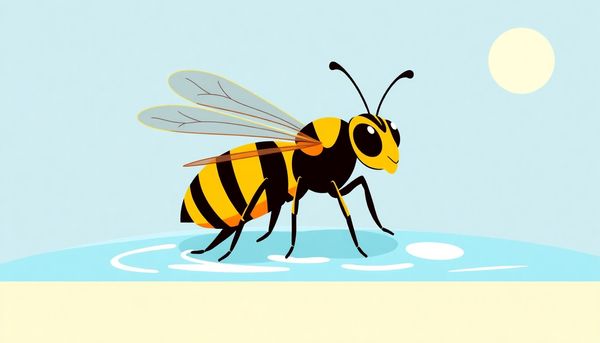
Surprising as it might seem, wasps have a strong aversion to setting up shop near other colonies. This peculiarity can be cleverly exploited with the use of fake wasp nests. The concept is simple but effective. By placing these artificial nests strategically around your yard, you can trick wasps into believing the area is already claimed, prompting them to seek residence elsewhere.
Early spring is the ideal time to introduce these decoys before wasps begin their nest construction. This preemptive measure ensures that any prospective wasps surveying your property would rather move than risk confrontation with a rival community. Hang these faux nests in spots distant from your pool and home to maximize their deterrent effect.
Personal experience has shown this method to be surprisingly effective. Last summer, after a particularly aggressive wasp encounter, a pair of fake nests transformed our buzzing backyard into a peaceful haven. Not only did it keep wasps away, but it also provided an interesting conversation starter with guests, who were often curious about the small, paper-like structures swaying in the breeze.
These decoys are a safe, non-toxic approach to wasp management, aligning with eco-conscious strategies that respect nature's balance. By encouraging wasps to relocate without harm, you can enjoy your poolside retreats in tranquility, knowing you've contributed to a harmonious coexistence with the natural world.
Create-Wasp-Free Zones
Establishing a wasp-free zone around your pool might sound like a dream come true, especially when you’re trying to enjoy a peaceful afternoon swim. But instead of resorting to harsh chemicals or frantic swatting, there are more peaceful methods to steer these winged invaders away. One clever trick involves using wasps' natural territorial instincts against them. Wasps are fiercely territorial creatures, and they’re not excited about setting up camp near a rival colony. This can work in your favor. By strategically placing fake wasp nests around your yard early in the season, you can effectively discourage new nests from appearing too close to your pool.
Another tactic taps into wasps' attraction to food. If you’ve ever hosted a barbecue, you’re probably familiar with their affinity for raw meat. Designate a corner of your yard, far from the pool, as their dining spot by hanging small pieces of raw meat. This decoy dining area can lure them away from your poolside gatherings. Just remember to manage this carefully; a tiny bit goes a long way and prevents unwanted odors or the attraction of other pests like flies.
These methods not only protect your pool area but also maintain the delicate balance of nature in your backyard. Embrace these strategies, and you might just find yourself enjoying your swims without the constant buzz of unwanted guests.
Install-Fake Nests Strategically
The buzzing of a wasp near a pool can make even the bravest swimmer hesitate. Thankfully, there's a clever way to keep them at bay: by installing fake nests. Wasps are territorial by nature, and they steer clear of areas they believe are already claimed. These impostor nests can be a game changer in the battle for poolside tranquility.
Strategically positioning these decoys requires a bit of planning. Begin by identifying areas around your property that are less trafficked by humans and pets but appealing to wasps. Hang the faux nests early in the spring before any real nests have been established. This timing is crucial as it tricks wasps into thinking the area is already occupied, diverting them to friendlier locales.
While you might be tempted to place the fake nests near the pool itself, consider opting for farther corners of your yard. This not only reduces the chance of wasps venturing too close to your splash zone but also keeps them away from entryways and patios, ensuring the entire outdoor space remains wasp-free.
A friend once tried this method and was amazed at the difference it made. Suddenly, the wasps that had been frequent visitors were nowhere to be seen. Of course, nothing is foolproof, but this eco-friendly strategy respects the delicate balance of nature while keeping your poolside gatherings sting-free.
Encourage-Natural Predators
Inviting nature’s hunters into your backyard might sound like an unusual strategy, but it’s remarkably effective for a bee- and wasp-free swimming zone. Natural predators, such as dragonflies, birds, and certain types of beetles, can play a crucial role in controlling these winged intruders. Dragonflies, for example, are known as the "mosquito hawks" of the insect world but have a penchant for snacking on bees and wasps too. A few strategically placed plants and water sources can attract these sleek hunters to your poolside.
Encouraging birds to visit your yard is another smart move. Birds like sparrows and swallows consider bees and wasps a delicious treat. To make your backyard more appealing to them, install birdhouses or hang feeders filled with seeds. You might also consider planting native flowers that produce seeds birds love. The more welcoming your yard is, the more frequently these natural predators will visit, significantly reducing the bee and wasp population around your pool.
For those who enjoy gardening, introducing plants such as marigolds or mint can help deter bees and wasps while simultaneously attracting predatory insects. By creating a harmonious environment where natural predators thrive, you're not only safeguarding your pool area from unwanted guests but also nurturing a lively and balanced ecosystem. This approach not only protects you but also respects the role each creature plays in the environment.
Experiment With Dryer Sheets
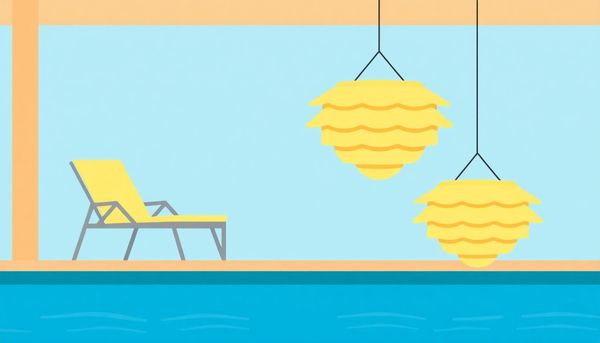
Unraveling the peculiar world of dryer sheets reveals unexpected possibilities. Among their many uses, warding off bees and wasps might seem like a stretch, yet some swear by this quirky technique. Picture a sunny afternoon by the pool, unclouded by the relentless buzz of winged intruders. A few strategically placed dryer sheets—often associated with the comforting scent of fresh laundry—might just turn the tide in your favor.
Start small; stash several dryer sheets in decorative baskets around the poolside. Their fragrance, rumored to be unpleasant to bees and wasps, could act as a natural deterrent. It's a harmless, cost-effective experiment, and if the buzzing diminishes, you'll have found a simple solution to your summertime pool woes.
Not everyone is convinced, though. Critics argue that it's merely an old wives' tale, a placebo for the backyard beekeeper. Some bees might even seem attracted to these scented sheets rather than repelled. Should the buzzing persist despite your efforts, consider this a fun, if futile, venture—one that costs little more than the price of a laundry cycle.
Remember, the goal isn't to eliminate these creatures entirely. Both bees and wasps play essential roles in our ecosystem. While dryer sheets might offer temporary respite, establishing alternative water sources or relocating nests with professional help ensures a more harmonious coexistence. So, while you explore creative bee deterrents, keep the broader picture in mind—a balance between enjoying your pool and preserving nature's delicate dance.
Explore Natural Bee-Repelling Techniques
Stepping into the world of natural bee deterrents can feel a bit like discovering hidden treasures in your backyard. Nature has its own toolkit to help us gently suggest to bees that our pool parties are private affairs. One strategy involves harnessing the power of scent. Certain essential oils, such as peppermint or eucalyptus, can be quite uninviting to bees. A friend of mine swears by this method, mixing a few drops of oil with water in a spray bottle and lightly misting around the pool area. It’s refreshing for humans and a gentle hint for bees to steer clear.
Next, consider the role of colors. Bees are naturally attracted to bright hues, especially those resembling flowers they pollinate. You might not want to redecorate your entire poolscape, but opting for softer, less vibrant tones in towels and furniture could make a difference. Think muted blues and greens, which are less likely to catch a bee’s eye.
Another understated yet effective approach involves growing bee-repelling plants. Lemon balm, citronella, and marigolds are not only visually appealing but also send a subtle message to bees that other pastures might be greener. A small garden or a few potted plants can transform your poolside into a bee-unfriendly zone. These methods not only promote coexistence but also maintain a bee-friendly environment, ensuring these vital pollinators continue to thrive elsewhere.
Provide Alternative Water Sources
Everyone loves a refreshing dip in the pool, but the constant buzz of bees and wasps can make even the most tempting water feel off-limits. The secret to a sting-free swim lies in offering these insects a more appealing watering hole. Bees, drawn to your pool by the allure of water, can be gently redirected by setting up alternative water sources.
A simple birdbath, shallow dish, or even a dripping hose can serve as a perfect substitute. Adding pebbles or small sticks to the water provides bees with a secure landing spot, preventing accidental drownings. For instance, my friend once transformed an old planter into a bee oasis by filling it with water and decorative stones. It became a buzzing hub of activity, but blissfully away from her poolside.
Maintaining these water sources is crucial. Evaporation can quickly turn them into dry basins, especially in hotter climates, so make sure to replenish them regularly. Start this setup before pool season kicks in, and with any luck, bees will already have a favorite hangout, leaving your pool more peaceful.
While bees are relatively easy to manage with alternative water, redirecting wasps might require a bit more strategizing. They might not be as easily swayed by water but are often deterred by territorial boundaries, such as fake nests placed strategically around your yard.
Leverage Wasp Territorial Behavior
In the realm of backyard diplomacy, understanding wasp behavior can turn a buzzing nuisance into a manageable situation. Just as some folks steer clear of crowded places, wasps prefer solitude. They avoid settling near other wasps, which is why you can harness their territorial instincts to your advantage. Imagine this: you’re at a summer barbecue, and you notice wasps swarming your steak. It turns out these critters are natural-born defenders of their space, and they're not fans of competition.
Here’s a clever trick. Consider purchasing faux wasp nests, available at many garden centers. By strategically placing these decoys around your yard, particularly before the wasps begin nesting, you signal to them that the area is already claimed. It’s like hanging a “No Vacancy” sign for wasps. Not only do these replicas deter wasps from building new nests nearby, but they also encourage them to seek other venues, away from your pool.
For an additional lure, create an irresistible distraction with a small portion of raw meat. Suspend a morsel of chicken or steak—uncooked, of course—far from your poolside oasis. This bait can divert their attention and redirect their gatherings across the yard. Just ensure it’s a manageable amount to avoid attracting other unwanted visitors, like flies.
By appealing to their territorial nature and appetites, you can coexist more harmoniously, enjoying your pool without the uninvited buzz of wasps.
Attract Wasps Away With Meat
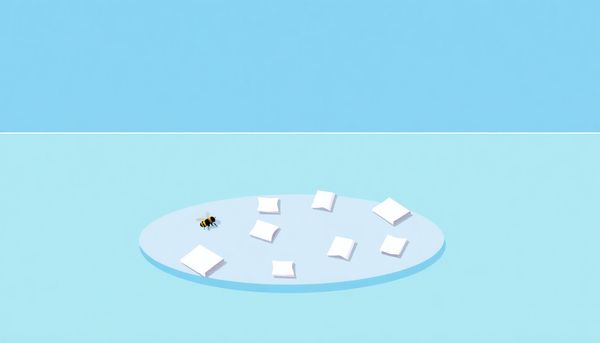
Wasps, with their piercing buzz and notorious sting, can turn a leisurely pool day into a military operation. Yet, instead of reaching for the spray, let’s venture down a more appetizing path to steer these winged guests away. Surprisingly, wasps have a serious hankering for meat. Think of them as the uninvited barbecue crashers, always hovering near the grill, eyeing the steaks before they sizzle. This peculiar palate can be quite handy in redirecting their interest.
To lure wasps away from your pool, consider setting up a meaty diversion. Hang a modest slice of raw meat—be it steak, chicken, or ground beef—in a far corner of your yard. Choose a spot that’s distant from the pool, perhaps near a tree or shrubbery, so the wasps find their feast without hovering over your swimming haven. Keep in mind, moderation is key. Use just enough meat to captivate their attention but avoid leaving it out too long. This prevents it from becoming a breeding ground for other nuisances like flies or, heaven forbid, maggots.
This method is both simple and effective, giving wasps a gastronomic delight while granting you a peaceful splash in the pool. Remember, nature’s balance benefits when creatures find their rightful place—preferably away from your pool party.
Redirect Wasps with Raw Meat
On a lazy afternoon, as you're lounging by the pool, the last thing you want is an uninvited swarm of wasps threatening your tranquility. Yet, there's a surprisingly simple way to lure these territorial insects away from your splash zone, and it involves something as mundane as raw meat. Wasps, it turns out, are carnivorous little creatures with an affinity for meaty treats. Their preference for protein means that a strategic offering can effectively distract them from your poolside fun.
Imagine you're prepping a backyard barbecue and notice wasps honing in on the grill. This behavior can be harnessed. By hanging a small piece of raw meat—think budget-friendly cuts like chicken wings or ground beef—in a designated area of your yard, you create a culinary decoy. The wasps gravitate toward this new, more appealing target, leaving your pool blissfully wasp-free. It's essential, though, to use only a modest portion. Too much meat could result in an unpleasant scenario with other pests like flies.
Position your wasp snack station at a reasonable distance from both the pool and any high-traffic areas. This keeps the little buzzers busy and ensures your summer afternoons remain undisturbed. Employing this method not only secures your poolside retreat but also exemplifies coexistence with nature's less cuddly yet vital pollinators. So next time you plan a dip, consider this savory diversion strategy and swim in peace.
Set Up Fake Nests
The summer sun shines on your backyard, and the pool glistens invitingly. Yet, the unwelcome company of bees and wasps can turn a perfect afternoon into a skirmish. But what if there was a way to outsmart these buzzing interlopers without harming them? Enter the art of deception with fake nests.
Wasps, in particular, are fiercely territorial creatures. They don’t take kindly to settling near another wasp colony, which you can cleverly exploit. By hanging fake wasp nests around your yard, you create the illusion of an already occupied space, effectively encouraging wasps to settle elsewhere. These decoy nests, available in garden centers or online, are best placed early in the spring before wasps begin scouting for new nest locations. This preemptive strike can help ensure your pool remains a no-fly zone.
Bees, on the other hand, might not be deterred by fake nests as effectively, but the strategy is worth a try for the wasps. Combining this tactic with alternative water sources for bees can create a harmonious environment where your pool no longer resembles a bustling watering hole to these insects.
Imagine lounging by your pool, sipping lemonade, while nature’s busy workers go about their business without bothering you. It's a peaceful coexistence, aided by a few clever decoys—a small effort for a sting-free summer.
Consult Professional Relocation Services
Consulting professional relocation services might seem like an extreme step, but it's often the most effective and environmentally-conscious approach to managing bee and wasp issues around your pool. The last thing anyone wants is a chaotic afternoon with a swarm of stingers hovering nearby. You might think of these professionals as the heroes who handle the things we’d rather not deal with ourselves. They bring expertise, tools, and a calm demeanor to what can feel like a panicked situation.
Remember the time when a swarm of bees decided to make my backyard their home? A local beekeeper turned out to be the solution. With gentle hands and a solid plan, he relocated the bees to a nearby apiary, ensuring their safety and mine. The process was fascinating and far less invasive than I imagined. If you’re not sure where to find such help, your town might have a directory or community forum that lists local beekeepers or pest control services skilled in humane relocation.
For wasps, professionals can strategically move nests without causing harm. This requires a delicate touch and understanding of insect behavior. Be clear about wanting a relocation, not extermination, to preserve the balance of your local ecosystem. After all, it’s not just about keeping your family safe; it’s about protecting the intricate web of life in your backyard. Relocation services ensure everyone wins, including the environment.
Relocate Nests With Professionals
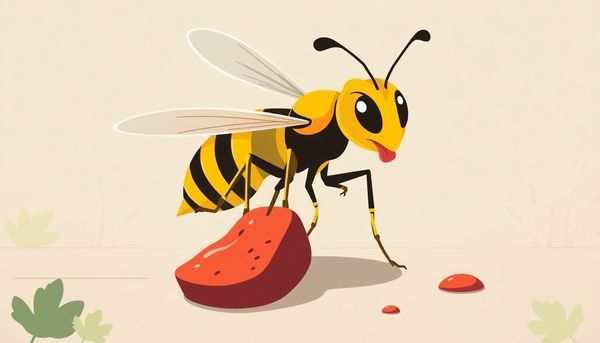
There’s a unique buzz in the air when bees and wasps claim your poolside as their own. While their presence might cause some discomfort, tackling the issue with a mindful approach is key. When nests have taken up residence nearby, enlisting professional help is the most prudent route.
A few summers back, a friend of mine faced a similar plight. Her backyard teemed with bees, and her once-inviting pool had become a cautious zone for her kids. Instead of reaching for the insecticide, she opted to call a local beekeeper. This choice not only ensured the safety of the bees but also preserved their ecological role. Beekeepers possess the expertise to safely relocate nests without disturbing the delicate balance of nature. With a gentle hand, they can transport bees to a place where they can continue their invaluable work without interfering with your poolside fun.
Needless to say, it's not just bees that can be responsibly relocated. Certain pest control experts can handle wasp nests too—provided you clearly communicate the desire for relocation over eradication. This way, you protect your family from stings while ensuring these natural pest controllers find a new home that’s far from your splash zone. Choosing to relocate instead of destroy contributes positively to the environment, offering a harmonious solution where nature thrives without compromising your backyard bliss.
Hire Expert Beekeepers
Ever found yourself swatting at bees and wasps while trying to relax by the pool, only to realize that you're the one intruding on their watering hole? Instead of resorting to harmful means, consider hiring expert beekeepers. These professionals are like the peacekeepers of the insect world, adept at relocating bees safely and efficiently, ensuring both your tranquility and the bees' survival.
A few summers ago, a friend of mine faced a similar dilemma. Her poolside paradise had turned into a buzzing hub for neighborhood bees. Desperate yet determined to avoid harming the bees, she called in a local beekeeper. With remarkable expertise, he identified a nearby hive and gently relocated it to a more suitable environment, far from the allure of chlorinated water. In no time, her pool was bee-free, and she had gained a newfound appreciation for these pollinators.
Beekeepers possess the knowledge to handle these creatures with care, minimizing risks for both humans and bees. They provide a sustainable solution by transferring entire colonies to apiaries where they can thrive and continue their crucial role in the ecosystem. If you're struggling with a bee invasion near your pool, reach out to your local beekeeping community. They might offer just the solution you need, protecting both your leisure time and our planet's invaluable pollinators.
Set Up Wasp-Deterrents
Wasps, with their menacing reputation, often inspire more fear than admiration. Yet, understanding their instincts can be your secret weapon in keeping them at bay. Rather than reaching for a can of insecticide, craft a plan that plays into their natural tendencies. Start with the fact that wasps are fiercely territorial. By placing decoy nests around your yard, you're essentially putting up a "no vacancy" sign. These faux nests signal to wasps that the territory is already claimed, prompting them to search for a new home away from your pool. It's an unobtrusive way to outsmart these winged visitors.
Additionally, turn their love for protein into a diversion tactic. On pool days, hang a small amount of raw meat—perhaps a cheap cut or some poultry—well away from your swimming sanctuary. This tempting treat will lure wasps in the opposite direction, keeping them preoccupied and away from your guests. Just ensure the meat is in a location where it can be quickly consumed to avoid odor issues.
For those particularly stubborn wasp groups or if there's a risk of allergic reactions, don't shy away from professional help. A pest control expert can relocate these insects without resorting to harmful chemicals that could taint your pool or yard. Balancing the ecosystem means respecting each creature's role, even when they're not your favorite backyard guests. With a mix of clever tactics and professional assistance, you can ensure wasps find a home far from your oasis.
Conclusion
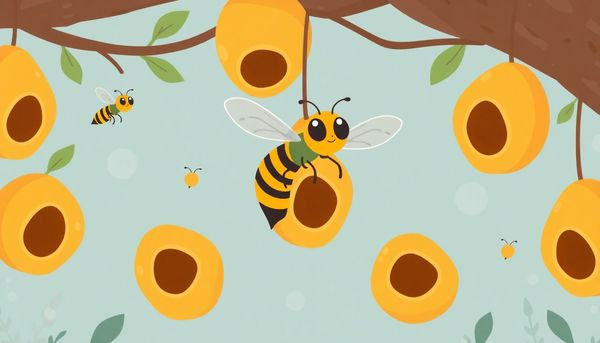
This article provided insights into maintaining your pool. Start your pool care journey today!
Want to become a pool maintenance expert? Our free Pool School course covers everything you need to know about pool care. From basic maintenance to advanced troubleshooting, you'll learn how to:
- Save thousands on pool repairs and chemicals
- Keep your water crystal clear year-round
- Prevent and solve common pool problems
- Master water chemistry with confidence
Join over 10,000 pool owners who have already transformed their pool care routine. Get started with our free Pool School course today!